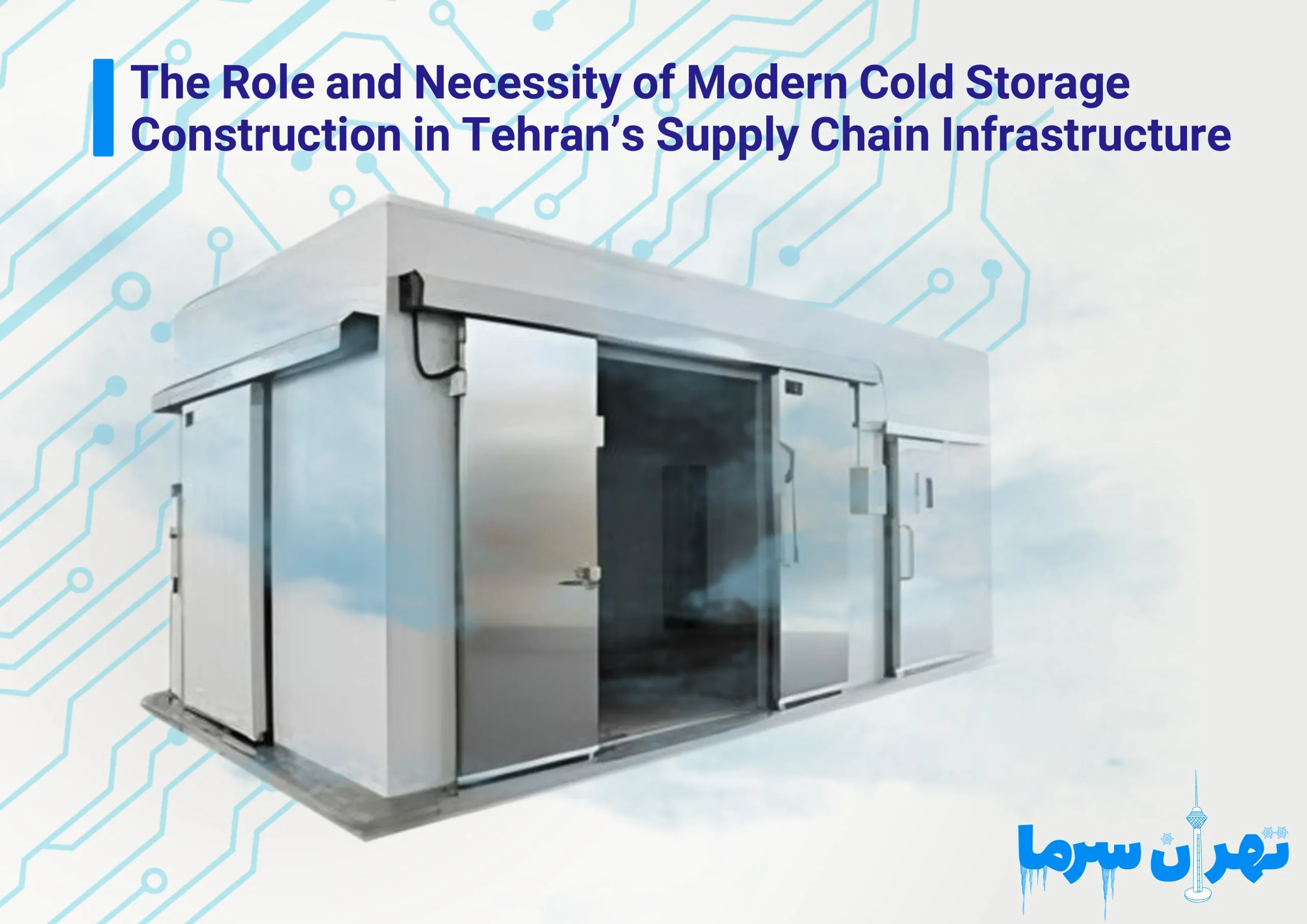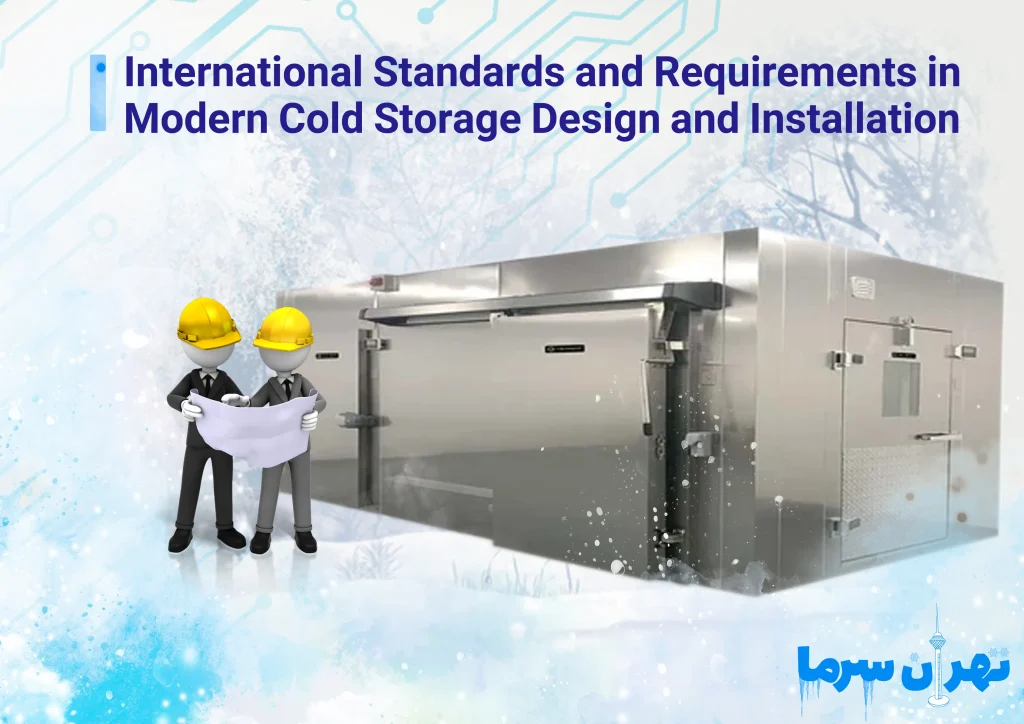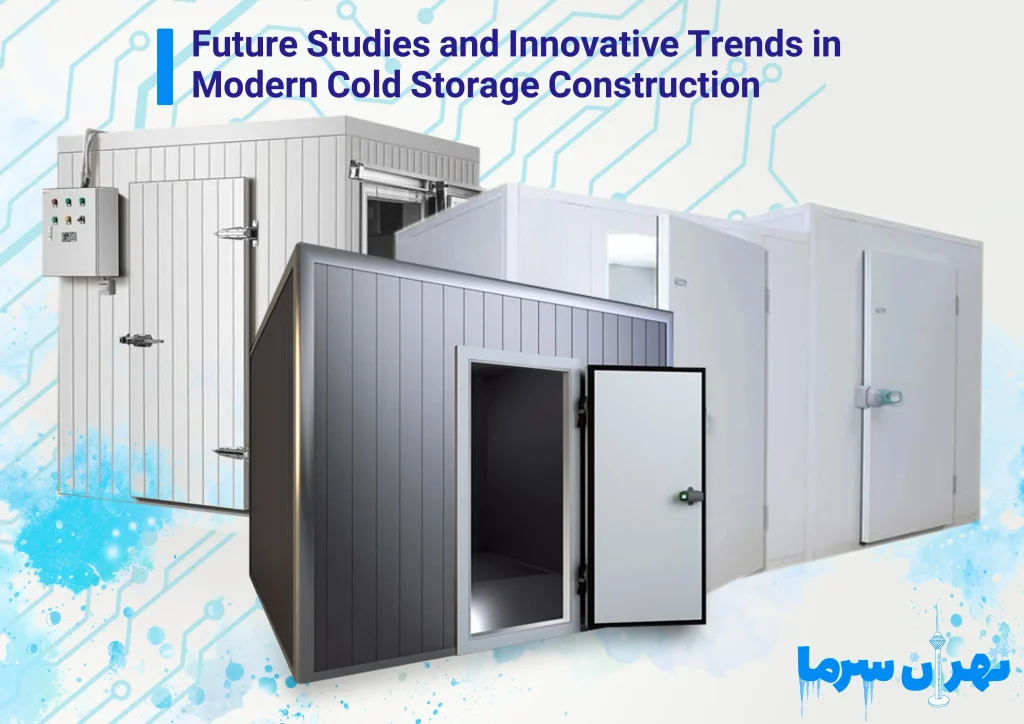The Role and Necessity of Modern Cold Storage Construction in Tehran’s Supply Chain Infrastructure

Today, modern cold storage construction is carried out using advanced technologies, energy-efficient equipment, and intelligent temperature control systems. The design and installation of modern cold storage include selecting high-quality insulating materials, proper design of refrigeration systems, and precise equipment installation. The construction of modern cold storage in Tehran has gained even greater importance due to the high concentration of food, agricultural, pharmaceutical industries, as well as restaurants and retail chains.
Addressing Past Challenges with Modern Cold Storage Construction
Traditional cold storage facilities faced numerous limitations. Problems such as high energy consumption, lack of precise temperature and humidity control, equipment wear, and absence of necessary standards reduced their effectiveness in serving industries. Modern cold storage construction, leveraging new technologies and sound design, provides a solution to these challenges.
The use of intelligent environmental control systems, advanced insulation, and energy-efficient refrigeration equipment ensures that product storage is stable and reliable. These features are especially important for Tehran, recognized as a hub for food, pharmaceutical, restaurant, and retail industries.
The role of modern cold storage in improving the supply chain goes beyond mere product storage. These facilities serve as a key link between producers and consumers. When agricultural or food products are received from producers, they must be transferred to a standardized environment as quickly as possible to maintain freshness and quality.
On the other hand, distributing these products on a city-wide and international scale requires a reliable and continuous network. In this context, the construction of modern cold storage in Tehran makes it possible to establish such a network and assures producers that their goods will reach consumers in optimal conditions without quality loss.
The Importance of Modern Cold Storage Design and Installation for Exports
Exports represent another crucial dimension of this topic. Due to its geographical location and transportation infrastructure, Tehran is one of the main gateways for exporting Iran’s agricultural and food products. Constructing modern cold storage in the city ensures that products can be stored according to global standards and remain competitive in international markets.
Exporting products without these infrastructures increases the risk of spoilage and quality deterioration, and also harms the country’s trade credibility. Therefore, modern cold storage acts as a strategic backbone for enhancing Iran’s position in global markets.
From an economic perspective, modern cold storage construction in Tehran helps reduce costs associated with product losses. A significant portion of Iran’s agricultural and food products is lost due to inadequate storage conditions. This issue not only causes direct financial losses but also places additional pressure on the country’s natural resources.
By establishing modern cold storage, this inefficient cycle can be corrected, and production resource efficiency can be increased. Additionally, these infrastructures create opportunities for new businesses in cold transportation, specialized packaging, and supply chain distribution, contributing to both local and national economic growth.
Social Dimensions of Modern Cold Storage Construction in Tehran
The social dimensions should not be overlooked. Providing safe, reliable, and accessible food for Tehran’s growing population is impossible without standardized cold storage. Modern cold storage ensures that food products reach the market without quality loss, safeguarding consumer health.
This issue is even more critical in pharmaceuticals and vaccines, as maintaining the cold chain for sensitive medicines can directly impact human lives. Therefore, developing these infrastructures has not only economic but also social and humanitarian significance.
International Standards and Requirements in Modern Cold Storage Design and Installation
Designing and installing modern cold storage is not limited to creating a cold space and installing refrigeration equipment. It encompasses a set of international standards and requirements whose adherence is essential to ensure quality, safety, and operational stability.
In today’s world, where food, pharmaceutical, and agricultural industries are rapidly expanding and global competition is intensifying, compliance with international standards can make a fundamental difference between an ordinary cold storage and an efficient, modern facility. Tehran and other industrial centers in Iran must develop cold storage that is designed and executed in accordance with these requirements to participate effectively in global trade.
One of the most critical areas of standardization in modern cold storage is food hygiene and safety. Organizations such as Codex Alimentarius and HACCP have established precise regulations for food storage to prevent microbial, chemical, and physical contamination. Adhering to these requirements in modern cold storage design and installation means planning hygienic pathways, using antibacterial materials, and ensuring easy-to-clean surfaces.
These considerations are vital not only in the food industry but also in pharmaceuticals, as storing vaccines and sensitive medicines requires an environment where even minor errors can have irreversible consequences.
Moreover, standards related to energy control and environmental sustainability are integral to this process. International organizations such as ASHRAE and ISO provide comprehensive guidelines on optimizing energy consumption and using environmentally friendly refrigerants.
Modern cold storage design must minimize energy loss, implement high-quality thermal insulation, and employ high-efficiency cooling systems. This is increasingly important today, given rising energy costs and global environmental concerns.
Safety requirements for structures and equipment also hold a special place in international standards. Modern cold storage must be designed according to fire, earthquake, and other potential hazard regulations. Electrical, lighting, and ventilation systems should be installed to minimize the risks of short circuits or excessive humidity.
Alongside planning emergency exit routes and following worker safety guidelines, these measures create an environment where modern cold storage is safe for storage and operation.
In addition to these technical requirements, adherence to logistical and supply chain standards is crucial. A modern cold storage facility should not merely be viewed as a storage space but must allow for rapid movement, easy loading and unloading, and direct connectivity with cold transportation systems.
Global organizations have established standards in this regard, which play a decisive role in product exports. For instance, coordination between cold storage facilities and refrigerated trucks or refrigerated shipping containers must ensure an uninterrupted cold chain.
Furthermore, digitalization and smart technologies are part of modern international requirements. Using intelligent monitoring systems, temperature and humidity sensors, and inventory management software allows modern cold storage to operate with minimal human error and maximum accuracy. These technologies, considered mandatory standards in many countries, enhance supply chain transparency, reduce waste, and improve service quality.
Innovative Technologies and Intelligent Systems in Modern Cold Storage Construction
One of the most prominent technologies in modern cold storage construction is the use of intelligent temperature and humidity control systems. These systems utilize sensors and advanced algorithms to monitor environmental changes in real time and adjust compressors and refrigeration equipment as needed.
This approach minimizes energy consumption and fully manages temperature fluctuations that could otherwise reduce product quality. Additionally, intelligent systems can issue necessary alerts during critical situations, allowing technicians to intervene quickly.
Another important technology in modern cold storage construction is the Internet of Things (IoT) and process digitalization. Connecting various equipment to a smart network enables remote control and management. Cold storage managers can monitor temperature, humidity, and overall system performance through applications or web-based software and make optimal decisions for product preservation. This level of intelligent control not only reduces human error but also enhances operational speed and service quality.
Moreover, using predictive and data analysis systems in modern cold storage design has transformed supply chain management. By analyzing data collected from sensors, these systems identify energy consumption patterns and product behavior over time, enabling the forecasting of future needs. Such technologies allow more accurate and faster managerial decisions, ensuring cold storage operates efficiently and cost-effectively.
Alongside intelligent systems, technologies related to energy optimization and environmental compatibility also hold a special place. The use of high-efficiency refrigerants, advanced thermal insulation, and energy-saving equipment, aligned with international standards, reduces energy consumption and environmental impacts. This approach, beyond economic benefits, is crucial for sustainable development and minimizing the carbon footprint of industries.
Energy Optimization and Resource Management in Modern Cold Storage Construction
Energy optimization and resource management are vital pillars in the design and implementation of modern cold storage, as these facilities consume a significant portion of energy in the food, agricultural, and pharmaceutical sectors. Any optimization not only reduces operational costs but also significantly lessens environmental impacts.
In modern cold storage, the use of energy-efficient and high-performance refrigeration equipment, optimized insulation design, and effective ventilation systems plays a decisive role in reducing energy waste. Furthermore, leveraging advanced technologies such as heat recovery, ventilation and cooling systems with intelligent control, and renewable energy sources like solar panels allows for sustainable and smart resource management.
Intelligent energy management in modern cold storage involves continuous monitoring of electricity consumption, data analysis, and forecasting refrigeration needs based on product volume and type, leading to reduced energy waste and longer equipment life. Additionally, modular and flexible system designs allow cold storage capacity to be optimized according to seasonal needs or market changes, ensuring resources are used without wastage.
This approach is not only economically significant but also contributes to a sustainable supply chain and reduced product loss, transforming cold storage facilities from mere storage spaces into intelligent resource management centers.
Future Studies and Innovative Trends in Modern Cold Storage Construction
The future of modern cold storage construction, with the emergence of innovative technologies and sustainable approaches, is moving toward smart, optimized, and environmentally friendly facilities. Current trends indicate that cold storage is no longer just a space for storage but is evolving into a smart hub for data and supply chain management, enhancing operational efficiency and service quality through information analysis and demand forecasting.
The use of IoT systems, precise temperature and humidity sensors, and intelligent management software enables real-time environmental monitoring and rapid decision-making, minimizing human error. At the same time, focusing on energy efficiency and renewable resources, such as solar energy and heat recovery systems, reduces costs and environmental impacts.
Modular and flexible cold storage design allows rapid expansion and adaptation to meet the diverse needs of different industries. Additionally, new technologies in packaging, storage, and product handling using robots and automated systems optimize internal and export transportation, reducing waste and improving product quality.
Cold Storage Construction with Tehran Sarma Engineering Company
Partnering with Tehran Sarma Engineering Company for cold storage construction provides a professional and reliable experience for various industries. Utilizing advanced technical knowledge, modern equipment, and a specialized team, the company manages the entire cold storage construction process—from design to installation and commissioning—integratedly.
The use of international standards, intelligent temperature and humidity control systems, and advanced refrigeration technologies guarantees product quality and freshness. Moreover, Tehran Sarma enhances cold storage efficiency and reduces operational costs by providing energy optimization solutions and periodic maintenance programs.
Choosing this company ensures a professionally executed project aligned with current and future market needs and creates a sustainable infrastructure for the supply chain.
For more information about cold storage construction pricing, you can visit Tehran Sarma’s website or contact 09201906418.
In conclusion, modern cold storage construction, design, and installation play a key role in supply chains and various industries by preserving product quality and reducing costs. In Tehran, given the growing market demand and the importance of food and agricultural industries, modern cold storage construction presents a valuable opportunity for sustainable development and enhancing refrigeration services.
Source: https://www.storagebuildingcompany.com/




 سردخانه
سردخانه برق
برق کمپرسور
کمپرسور کمپرسور بیتزر
کمپرسور بیتزر کمپرسور کوپلند
کمپرسور کوپلند کمپرسور بوک
کمپرسور بوک کمپرسور دانفوس
کمپرسور دانفوس کمپرسور منیروپ دانفوس
کمپرسور منیروپ دانفوس کمپرسور امبراکو
کمپرسور امبراکو کمپرسور پاناسونیک
کمپرسور پاناسونیک کمپرسور سابکول
کمپرسور سابکول کمپرسور کوپلند
کمپرسور کوپلند کمپرسور اسکرال کوپلند
کمپرسور اسکرال کوپلند کمپرسورفراسکلد
کمپرسورفراسکلد کمپرسور رفکامپ
کمپرسور رفکامپ کمپرسور اسکرال دانفوس
کمپرسور اسکرال دانفوس گاز مبرد
گاز مبرد گاز R22
گاز R22 گاز R134
گاز R134 گاز R404
گاز R404 گاز R407
گاز R407 گاز R410
گاز R410 گاز R508
گاز R508 کندانسور هوایی
کندانسور هوایی اواپراتور
اواپراتور اواپراتور آرشه
اواپراتور آرشه اواپراتور صابکول
اواپراتور صابکول اواپراتور آسه
اواپراتور آسه اواپراتور نیک
اواپراتور نیک اواپراتور آرتک
اواپراتور آرتک اواپراتور نوین
اواپراتور نوین اواپراتور تبادل کار
اواپراتور تبادل کار درب
درب ساندویچ پنل
ساندویچ پنل فن سردخانه
فن سردخانه روغن کمپرسور سانیسو
روغن کمپرسور سانیسو متعلقات سردخانه
متعلقات سردخانه